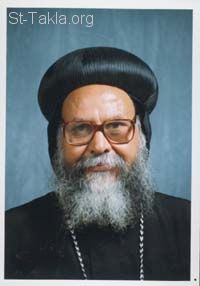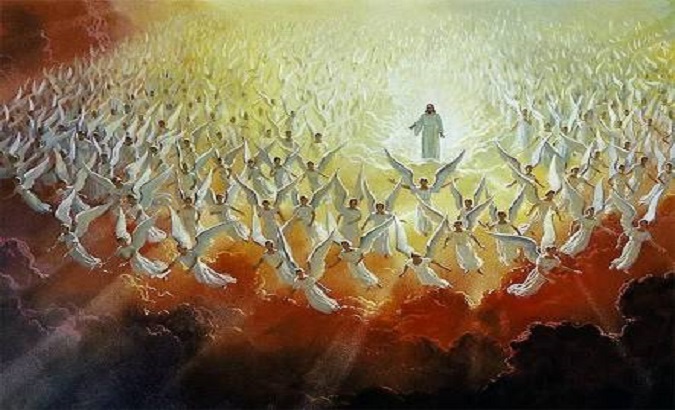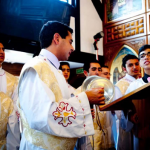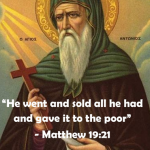Praise is the work of angels who are always standing before the Throne of Grace praising God without tire or boredom, because it is their utmost pleasure, fullness and joy to praise their Creator. Praise in the church is the highest level of prayers and talking to God. It is actual participation with the Heavenly …
Praise is the work of angels who are always standing before the Throne of Grace praising God without tire or boredom, because it is their utmost pleasure, fullness and joy to praise their Creator. Praise in the church is the highest level of prayers and talking to God. It is actual participation with the Heavenly hosts in praising God the Creator. St. Gregory the Theologian says in his wonderful Liturgy: “Who gave those on earth the praise of the Seraphim, accept our voices with the unseen, count us with the heavenly hosts…”
Praise is the precious heritage that the fathers kept in our Holy Church, it satisfies our prayers in our soliloquy to God, it consists of praise, glorification, thanks, requests…etc. The believer who learns the Praise, its awesome tunes and different ways, becomes a pillar in the church, and as one of the saints who are the water which waters the tree, (i.e. the church) and makes it flourish, blossom and gives fruits.
We talked briefly about the Doxologies, which are praises of the Saints, and they narrate the life of the saint in a simple tune. After, comes the Fourth Hoos, which is the three last Psalms. considered a talented servant carrying one of the dearest mysteries of the church. In addition, there are lots of doctrines, rites, and spiritual contemplations in the Praise.
In this article, I wanted to highlight the Rite of the Praise and its procedures, its contents concerning the Hooses, Psalis, Theotokayas and how they include Orthodox fatherly teachings, theological expressions, beliefs, doctrines and rites. I included some detailed explanations and meditations for the Midnight Praise, The First Hoos, which is the Praise of Victory after the miraculous crossing of the Red Sea, is also a detailed interpreting for the Second Hoos, which is Psalm 135, full of thanksgiving to the Gracious Lord.
Then the Third Hoos, which is the Praise of The Three Young Saints in the furnace. In the Praise for the Saints, I mentioned the story of their lives briefly in order to know a bit about everyone of them, because we benefit a lot from their lives and faith. The blood of the martyrs is considered the seeds sown for the church, also the struggle, devoutness, sweat and tears.
Prayers and Praises and the Spirit of Community: Prayers and Praises which are carried inside the church are actually a means of community, activated by the Holy Spirit, making all the members of the church one body. This is a very old tradition in our church. We read about the early fathers in the 3rd and 4th century who used to live in solitude, and used to come to church every Saturday and Sunday to spend the night in praises and prayers, ending with the Holy Liturgy.
If solitude lasts for a long time, it becomes dangerous.
Attending praises and prayers with the rest of the monks would distract the soul from any egoism or unhealthy solitude.
The church is not only satisfied by the presence of the believers in praises and prayers, but it also insists on the presence of the saints who departed and the holy angels. That is why the church specialised some parts in praises for them, with glorification and pleadings in every occasion.
The pictures of the saints decorating the Icon holder and facing the believers, assure their presence and community with us in the church.
“I will praise You with my whole heart; Before the gods I will sing praises to You.” (Ps. 138:1)
“Praise the Lord! Praise God in His sanctuary; Praise Him in His mighty firmament!” (Ps. 150:1)
“Kings’ daughters are among Your honorable women; At Your right hand stands the queen in gold from Ophir.”(Ps. 45:9)
“I will declare Your name to My brethren; In the midst of the assembly I will praise You.” (Ps. 22:22)
Praising is a Community with the Heavenly Chorus: Participating in praises at the church, or even listening, is considered a community with the chorus of those who are living and those who have departed. Thus, in the Fourth Hoos we pray “Praise God in all His Saints,” because every service offered by a person in the church is “in the saints.” We are praising according to what those saints handed to us concerning their words, faith, tradition….etc.
He Who Gave Those on Earth The Praise of The Seraphim: The Seraphim are the highest rank of angels. Seraphim means “the inflamed,” because they are inflamed with God’s love and warmth in His worship, praise and service. Isaiah the Prophet mentioned this rank in his vision in Chapter Six. He heard them singing their everlasting hymn “And one cried to another and said: ‘Holy, holy, holy is the Lord of hosts; The whole earth is full of His glory!’” (Is. 6:3).
In the wonderful Liturgy of St. Gregory the Theologian he says: “Who gave those on earth the praise of the Seraphim, accept our voices with the unseen, count us with the heavenly hosts…”
Here on earth, we use the same praise as that in the heavens (Holy, Holy, Holy…), and this is originally the Seraphim’s praise which Isaiah the Prophet heard them singing, while surrounding the Awesome Divine Throne…
Join Us: Sign Up Today!











